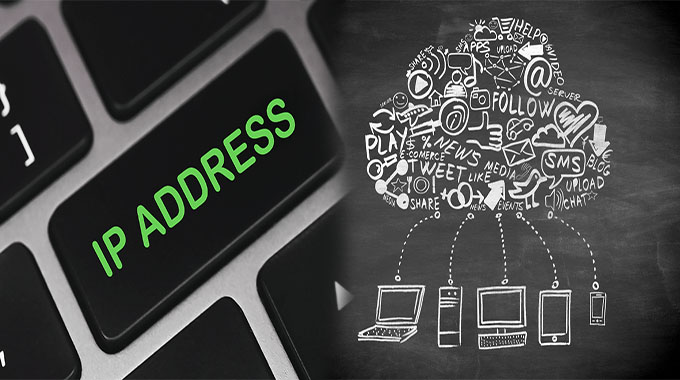If you’re like most people, the internet is a huge part of your life. It’s how you connect with friends and family, it’s how you keep up with the news and even how you learn about new things. But what is it exactly? What does this thing we call “the internet” actually do? Well, for one thing, it allows us to surf the web by connecting us through networks of computers all over the world! The simple answer is that there are two types of IP (Internet Protocol) addresses: public and private. Public IP addresses are assigned by ISPs (Internet Service Providers), while private IP addresses are assigned by organizations on their internal networks or within their intranets
To understand what an IP address is and why should care about them keep reading…
An IP address is a unique identifier for each device on the internet.
An IP address is a unique identifier for each device on the internet. It’s not exactly an email address or phone number, but it can be used to locate any computer or other device that’s connected to the web.
An IP address is assigned by Internet Service Providers (ISPs) and is unique for each user or device, so if you have two computers in your home and both are connected to your ISP via Ethernet cables, then both will receive an IP address from them when they start up their connection.
IP addresses are 32-bit numbers ranging from 0-255; although there are only 4 billion possible combinations, most of these have already been allocated by IANA (The Internet Assigned Numbers Authority).
IP addresses are assigned by Internet Service Providers (ISPs) and are unique for each user or device.
IP addresses are assigned by ISPs and are unique for each user or device.
An IP address, or Internet Protocol address, is a 32-bit number ranging from 0 to 255 that identifies your computer on the internet. The most common type of IP address is called IPv4 because it was created in 1981 and is still being used today.
IPv4 addresses have only about 4 billion possible combinations (2^32). As more people use the Internet, we will eventually run out of available IPv4 addresses; this problem has already started happening in some parts of the world where there are not enough available IPv4 addresses for everyone who wants one!
Each computer connected to the internet has its own IP address.
Each computer connected to the internet has its own IP address. An IP address is a unique identifier for your computer or device that allows it to communicate with other systems on a network. Your ISP assigns an IP address when you connect to their service, and this number remains constant unless you change providers or move to another country.
IP addresses are 32-bit numbers ranging from 0 to 255 (0 being reserved), so they can be represented by 4 numbers ranging anywhere between 0-255 each:
- XXXXYYYYZZZZZ
Every device connects to the internet through an ISP and an internet service provider assigns your computer, tablet or phone an IP address.
Every device that connects to the internet, from your laptop to your smartwatch, has an IP address. The “IP” part stands for Internet Protocol and it works like a phone number: every device has one so it can be reached on the web.
IP addresses are assigned by an ISP (internet service provider). When you sign up with an ISP they will assign your computer or other devices one or more of these four things:
- An IP address – Every device needs its own unique number so that others know where it is located on the internet. Your computer will get one automatically when you connect through broadband or wireless access points provided by ISPs; but if you’re using dialup then there’s no automatic allocation process–you’ll have to request one from your ISP instead (and make sure they give it out before connecting).
- A DNS server address – This tells computers how they can find other computers’ domain names by converting them into numbers — i.e., “google” becomes 216.58….
The most common type of IP address is called IPv4 because it was created in 1981 and is still being used today.
The most common type of IP address is called IPv4 because it was created in 1981 and is still being used today. An IPv4 address is a 32-bit number that consists of four 8-bit sections, each separated by periods (e.g., 192.168.1.1). Each section can be any value between 0 and 255, so an IP address could be written as 0x0000000000000001 or 0xFFFFFFFFFFFFFFFFF000000100000002 if you wanted to get really detailed about it!
IPv4 addresses are 32-bit numbers ranging from 0 to 255.
IPv4 addresses are 32-bit numbers ranging from 0 to 255. They’re the most common type of IP address, and they’re the only type that can be used on the internet. This means that when you visit a website or send an email, your computer must use IPv4 to communicate with its host server.
You can find your local IP address by visiting whatismyipaddress.com/locator .
When you visit a website, your computer or device is assigned an IP address. This number is used to route traffic and identify each user or device on the Internet. Your ISP (Internet Service Provider) assigns this address to you when they provide internet service in your area. The IP address consists of 32-bit numbers ranging from 0 to 255, with each number being separated by dots (e.g., 1234567890).
This tool will help you figure out your public IP address but not your private one.
You can use this tool to figure out your public IP address but not your private one. The reason for this is because it relies on a third-party service that may not be able to access the same information as you can when using other tools.
IPv4 addresses are 32-bit numbers ranging from 0 to 255, while IPv6 addresses are 128-bit numbers ranging from 0 to 65535 (when written in hexadecimal).
Your public IP address can be used by the websites you visit to identify you. If someone wants to know who you are, they’ll use this number to find out!
Your public IP address is the one that is visible to other computers on the internet. If someone wants to know who you are, they’ll use this number to find out!
An IP address is like a home address for computers. It allows computers on different networks (like your home network) or in different countries (like America) to communicate with each other over long distances by sending data through intermediate networks called routers, which direct traffic based on its destination’s IP address.
Internet Protocol (IP) addresses are unique identifiers that every device connected to the internet uses. They’re assigned by an internet service provider (ISP), and they tell other computers where to send data packets when they’re sent from one device to another. Each computer or mobile phone has its own IP address, which means that if you want to know who someone is or where they are located when using the internet, this number will help!














